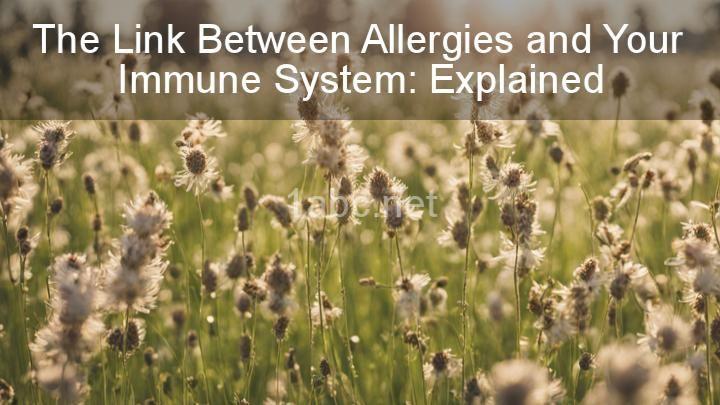The Link Between Allergies and Your Immune System: Explained

Welcome, readers!In today's blog post, we are going to explore the fascinating link between allergies and your immune system. Allergies are a common occurrence that many of us experience in our daily lives. From seasonal allergies that make us sneeze and itch to food allergies that can cause severe reactions, allergies can have a significant impact on our overall well-being. Understanding how allergies and the immune system are interconnected is essential for managing and preventing allergic reactions effectively.
Before we dive into the details, let's take a moment to define allergies and their common symptoms. Allergies, in simple terms, are an overreaction of the immune system to substances that are normally harmless, known as allergens. Common symptoms of allergies include sneezing, itching, runny nose, watery eyes, and skin rashes. These symptoms can range from mild to severe, depending on the individual and the allergen involved.
The prevalence of allergies in today's society is astonishing. It is estimated that more than 50 million Americans suffer from allergies, and this number continues to rise each year. Allergies can affect people of all ages, from infants to the elderly. It is important to note that allergies vary from person to person. What may trigger an allergic reaction in one individual may not affect another person at all. This is why it is crucial to understand how our immune system responds to allergens.
Our immune system plays a vital role in protecting our bodies from harmful pathogens and foreign substances. It is a complex network of cells, tissues, and organs that work together to defend against invaders. When an allergen enters our body, the immune system identifies it as a threat and initiates an immune response.
The immune response to allergens is primarily mediated by a type of antibody called immunoglobulin E (IgE). IgE antibodies are produced by the immune system in response to specific allergens. These antibodies bind to the allergens, triggering the release of various chemicals, such as histamine, that cause allergy symptoms.
Understanding the role of IgE antibodies in allergic reactions is crucial. When a person with allergies is exposed to an allergen, their immune system produces large amounts of IgE antibodies specific to that allergen. These IgE antibodies then attach themselves to immune cells called mast cells, which are found in tissues throughout the body. The next time the person encounters the same allergen, the allergen binds to the IgE antibodies on the mast cells, causing the release of histamine and other chemicals that lead to allergic symptoms.
Allergic reactions can manifest in various ways, depending on the type of allergen and the individual's immune response. Seasonal allergies, also known as hay fever, are triggered by airborne allergens such as pollen. Food allergies can cause immediate reactions, such as hives or difficulty breathing, after consuming a specific food. Other common allergens include pet dander, dust mites, insect bites, and certain medications.
Identifying possible allergens in our lives is essential for managing allergies effectively. Keeping track of symptoms and seeking medical advice is crucial for proper diagnosis. Consulting with healthcare professionals can help identify the specific allergens triggering your symptoms and guide you towards appropriate management strategies.
Managing allergies involves a combination of avoidance, medication, and in some cases, immunotherapy. Avoiding triggers is an essential aspect of managing allergies. If you are allergic to pollen, for example, staying indoors on days when the pollen count is high can help minimize symptoms. Medications such as antihistamines can provide temporary relief from allergy symptoms. Immunotherapy, on the other hand, aims to desensitize the individual to specific allergens by gradually exposing them to increasing amounts of the allergen. This can be done through allergy shots or sublingual tablets.
The future of allergy research holds promising advancements that may lead to improved prevention and treatment options. Ongoing research efforts are focused on understanding the underlying mechanisms of allergies and developing new medications, immunotherapies, and diagnostic tools. With these advancements, we may be able to better prevent allergies or find more effective treatments to help those affected by allergies live a better quality of life.
In conclusion, allergies and the immune system are intricately linked. Understanding how our immune system responds to allergens and the role of IgE antibodies is crucial for managing allergies effectively. Identifying possible allergens, avoiding triggers, and seeking medical advice are essential steps in managing allergies. With ongoing research, the future holds promise for improved prevention and treatment options. Remember to stay informed about allergies and consult with medical professionals for personalized advice.
Thank you for joining us on this journey of exploring the link between allergies and your immune system. If you have any comments or questions, please feel free to leave them below.
FREQUENTLY ASKED QUESTIONS
What are allergies?
Allergies are an overreaction of the immune system to substances that are usually harmless. These substances, called allergens, can include things like pollen, pet dander, mold spores, certain foods, or medications. When someone with allergies comes into contact with an allergen, their immune system produces a response that can lead to symptoms such as sneezing, itching, watery eyes, congestion, or skin rashes. In severe cases, allergies can cause a life-threatening reaction called anaphylaxis.
How does the immune system work?
The immune system is a complex network of cells, tissues, and organs that work together to defend the body against harmful invaders such as viruses, bacteria, and parasites. Here is a simplified explanation of how the immune system works:
- Recognition: The immune system can recognize both "self" (the body's own cells) and "non-self" (foreign substances). It identifies harmful microbes by recognizing unique molecules called antigens present on their surface.
- Activation: When a foreign antigen is detected, specialized cells of the immune system, such as macrophages or dendritic cells, engulf and process the antigen. They then present fragments of the antigen on their surface to activate other immune cells.
- Communication: Immune cells release chemical messengers called cytokines that allow them to communicate with each other. This helps in coordination of the immune response.
- Response: The immune system has two main components—innate immunity and adaptive immunity.
- Innate immunity: This is the first line of defense and provides immediate but non-specific protection. It includes physical barriers like the skin, as well as immune cells like neutrophils and natural killer cells that attack pathogens.
- Adaptive immunity: This is a more specific response that is tailored to a particular pathogen. It involves the production of specialized proteins called antibodies and the activation of specific immune cells, such as T cells and B cells. These cells work together to eliminate the pathogen and remember it for future encounters, providing long-lasting immunity.
- Elimination: Once activated, immune cells work to eliminate the pathogen. They can directly kill infected cells or produce antibodies that bind to the antigens on the surface of the pathogen, marking it for destruction by other immune cells.
- Regulation: To prevent excessive immune reactions, the immune system has regulatory mechanisms in place. These mechanisms ensure that the immune response is properly controlled and does not harm the body's own cells.
Overall, the immune system is a highly sophisticated defense mechanism that plays a crucial role in protecting the body from infections and diseases.
What is the connection between allergies and the immune system?
Allergies are closely linked to the immune system. When a person with allergies comes into contact with an allergen (e.g., pollen, pet dander, certain foods), their immune system overreacts and treats the harmless substance as a threat. In response, the immune system releases a chemical called histamine, which triggers allergy symptoms such as sneezing, itching, congestion, and swelling. The immune system's purpose is to protect the body from harmful substances, but in the case of allergies, it mistakenly identifies harmless substances as harmful and initiates an immune response.
Why do some people develop allergies while others don't?
The development of allergies is influenced by a combination of genetic and environmental factors. Here are some possible reasons why some people develop allergies while others do not:
- Genetic predisposition: Allergies can run in families. If one or both parents have allergies, there is an increased likelihood that their children will develop allergies as well. However, having a family history of allergies is not a guarantee that an individual will be allergic to a specific substance.
- Immune system response: Allergies occur when the immune system overreacts to harmless substances, such as pollen, dust mites, or certain foods. Some individuals may have immune systems that are more prone to overreacting, leading to the development of allergies.
- Exposure to allergens: The more an individual is exposed to certain allergens, especially during early childhood, the higher the chance of developing an allergy. Environmental factors, such as living in a highly polluted area, may also contribute to the development of allergies.
- Hygiene hypothesis: According to this theory, a lack of exposure to certain microorganisms in early childhood may lead to an increased risk of developing allergies. This hypothesis suggests that excessive cleanliness and limited exposure to bacteria and viruses can affect the development of the immune system.
- Other factors: Other factors, such as having a weakened immune system or experiencing certain respiratory infections, may increase the likelihood of developing allergies.
It's important to note that the development of allergies is a complex process, and not all factors are well understood. It is recommended to consult with a healthcare professional for a thorough evaluation and diagnosis if you suspect you have allergies.




